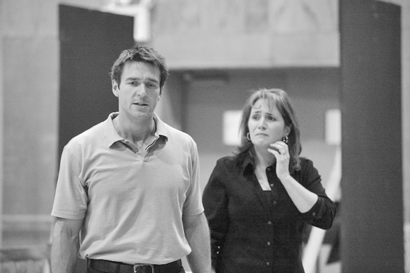Patricia Racette’s voice consistently silences the critics and skeptics
I was already enamored of Patricia Racette’s voice and artistry when I heard her speak at the Music Critics Association conference in Santa Fe four summers ago. As the sole singer on a panel devoted to the vocal arts, Racette grew increasingly exasperated as one critic after another discussed their favorite historic vocal recordings in purely technical terms.
Finally, with her stunningly dressed soprano partner Beth Clayton offering silent support from the audience, she blurted out, “But how does it make you feel? No one is talking about how the music feels to you.”
For once, a roomful of critics had nothing to say.
“When you think about it,” Racette told Gay City News in a recent interview, “critics don’t necessarily know how it’s done. They can make observations and criticisms of what they see, and can speak with great authority. But, if you don’t actually train and know how to sing in the way is necessary in opera and classical music, how can you feel comfortable commenting on and explaining why something didn’t work out? Sometimes the adjectives and the way critics describe singing doesn’t even make sense to me.”
Racette disregarded potential critics when she and Clayton arranged a major Opera News coming out interview in 2002.
“Mostly our decision was applauded and congratulated, which is lovely,” Racette recalled. “I’d had some people voice reservations out of concern, but I didn’t really take inventory of opinions before acting. It was a very personal choice, and something I don’t regret.”
Has there been any backlash? Not that she’s aware of.
“Of course, I don’t know about the offers that haven’t been made to me,” she acknowledged. “I would be naïve to think that resistance wouldn’t happen on some level, because the world is as it is. Luckily, I haven’t been aware of the negatives.”
Racette reserved talk of tragedy for her imminent Met undertaking as Roberta Alden in the world premiere of Tobias Picker’s “An American Tragedy.” The star-studded cast includes Susan Graham, Nathan Gunn, Dolora Zajick, Jennifer Larmore, Kim Begley, William Burden, and Richard Bernstein. If you want to verify someone’s opera queen quotient, read him the cast list and check his saliva level.
Racette finds Gene Scheer’s libretto a bit truer to Theodore Dresher’s scandalous, banned-in-Boston novel of 1925 than Paramount’s second film adaptation, the 1951 Oscar-winning “A Place in the Sun” starring Elizabeth Taylor, Montgomery Clift, Shelly Winters, and Raymond Burr.
“It’s the story of following the American dream,” she said, “and the folly and tragedy that can result from certain choices.”
As someone who sang the title role in the Santa Fe Opera world premiere of Picker’s first opera, “Emmeline,” Racette is familiar with his style and predilections.
“I like that Tobias often composes to American stories we can relate to,” she said. “The opera’s very human. We get to know these people and really get a sense of what’s going on inside them.
“The music has a little bit of everything—some beautiful, lyrical moments, and some really spiky dissonance. I think the impact is going to be great. The set is really wonderful. You couldn’t ask for a better group of collaborators.”
Like Renée Fleming, Racette came to opera by way of jazz. First exposed to operatic literature in college voice classes at the age of 19, she ended up getting hooked on the “wonderfully cathartic” aspects of opera.
Two decades later, at age 40, she contemplates a new foray into cabaret.
“I’m just starting to get it rolling,” she reported. “I just love it. I sing and sound like a cabaret singer, not at all like an opera singer. It’s just a matter of time until I do it more and more and get recorded.”
When Racette first performed cabaret in public in the summer of 2004, she could feel the stunned reaction in the room. She was singing low Es and Fs in cabaret style, which the opera fans in attendance were not expecting.
“They ended up loving it, but I was sweating those first couple of songs,” Racette recalled.” I thought, oh my God, they hate it. [Chuckling.] It’s a dangerous life.
“Honestly, if I could do cabaret the majority of the time, it would thrill me to no end. It’s my soul speaking at its simplest.”
At the end of our chat, Racette touched on the interactions between performer and audience.
“I think it’s difficult as an artist to leave your cocoon too much,” she said. “You make yourself so vulnerable, and you want to be loved, adored. You want to go out there and feel you’ve changed someone’s life by what you’ve done.
“It’s that private little piece of your soul that you’re offering the audience that you have to be protective about, not from them, but for them.”
gaycitynews.com



































